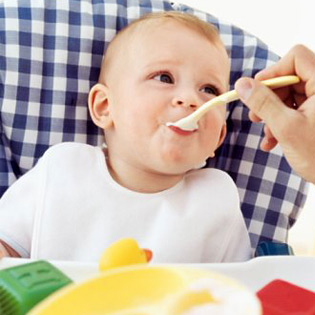Vitamin Supplements
Human milk contains a natural balance of vitamins, especially C, E, and the B vitamins, so if you and your baby are both healthy, and you are well nourished, your child may not require any supplements of these vitamins.
Breastfed infants need supplemental vitamin D. This vitamin is naturally manufactured by the skin when it is exposed to sunlight. However, the American Academy of Pediatrics feels strongly that all children should be kept out of the direct sun as much as possible and wear sunscreen while in the sun to avoid long-term risk of sun exposure, which may contribute to skin cancer. Sunscreen keeps the skin from manufacturing vitamin D. For that reason, talk to your pediatrician about the need for supplemental vitamin D drops.
The current Academy recommendation is that all infants and children should have a minimum intake of 400 IU (International Units) of vitamin D per day beginning soon after birth. Prepared formula has vitamin D added to it; so if your baby is drinking at least 32 ounces of formula (1000 ml), vitamin D supplementation is not needed. In addition, once your baby is one year old and on vitamin D milk, extra vitamins with vitamin D are no longer needed. Discuss the need for supplements of vitamins or minerals with your doctor.
Iron Supplements
Most babies are born with sufficient reserves of iron that will protect them from anemia. If your baby is breastfed, there is sufficient, well-absorbed iron to give her an adequate supply so that no additional supplement is necessary. When she is about six months old, you should be starting your breastfed infant on baby foods that contain supplemental iron (cereals, meats, green vegetables), which should further guarantee sufficient iron for proper growth. When you add solid foods to your baby’s diet, continue breastfeeding until at least 12 months. Check with your child’s doctor about vitamin D and iron supplements during the first year
If you are bottle-feeding your baby, it is now recommended that you use iron-fortified formula (containing from 4 to 12 mg of iron) from birth through the entire first year of life. Premature babies have fewer iron stores, so they often need additional iron beyond what they receive from breastmilk or formula.
Source
American Academy of Pediatrics

Your Baby checkup
what are the vaccinations that he should have taken until now?
Generate a report for my baby.
Track Your Baby Vaccinations
Find Your Baby name
Mohandessin
01002195777
01000012400
0233048350
Beverly Hills
01000012900
0238576831
El Tagamo3
Al Sheikh Zayed
02- 38514031
01000608597


